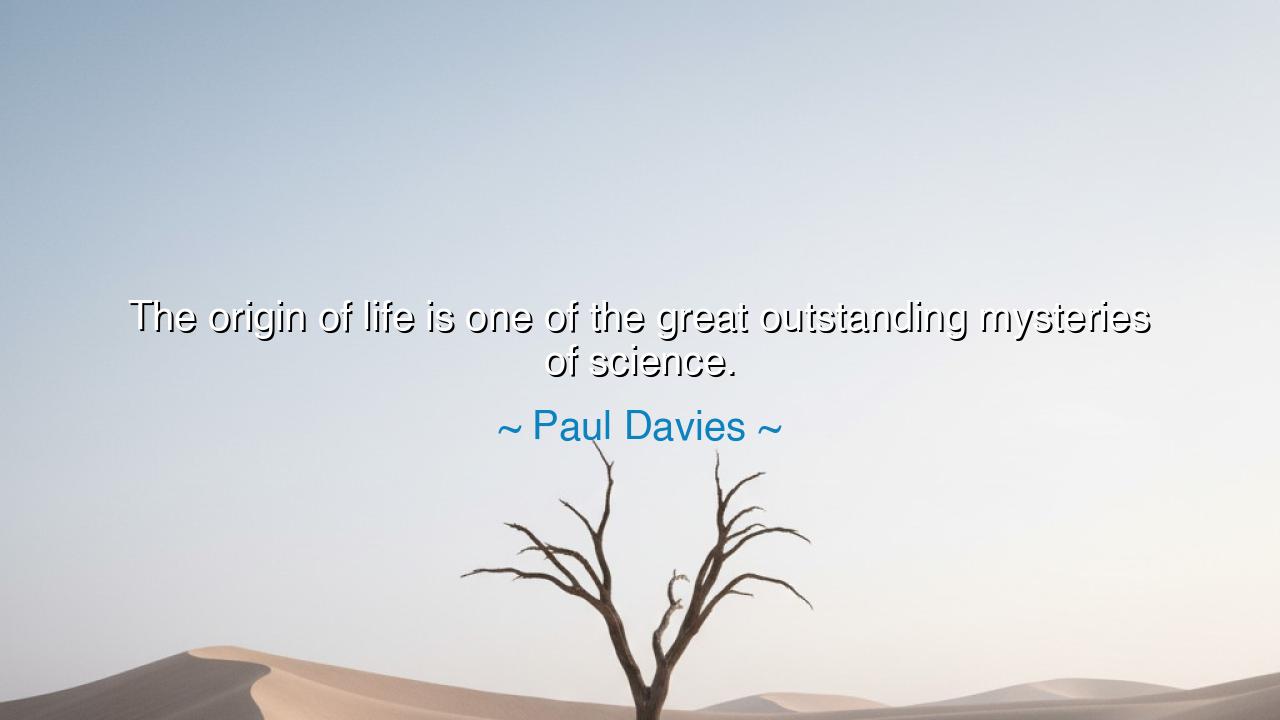
The origin of life is one of the great outstanding mysteries of






Hear, O seekers of the eternal truth, for I bring forth the words of Paul Davies, a man who, like the ancient sages, gazes into the mysteries of the universe with eyes full of wonder and reverence. “The origin of life is one of the great outstanding mysteries of science.” These words carry the weight of centuries, for they speak to a question that has haunted humanity since the dawn of thought: Where did life come from? It is a question that stirs the soul, one that pulls at the heart of our curiosity, our need to understand the very nature of existence.
In the time of the ancient Greeks, the question of life’s origin was pondered by philosophers and seers. Aristotle, that great mind of antiquity, spoke of life as an eternal force that flowed through all living things, a force that could not be explained merely by observation, but by a deeper understanding of purpose and essence. The ancients were not content to look at life as a mere collection of parts—they saw life as something sacred, something that tied all beings together in an intricate web of balance and interdependence. But even they, with their profound wisdom, could not explain where life began, or what brought the first breath to the universe. Their questions echo through the halls of time, and today, we still seek the answers they so longed for.
Davies, in his wisdom, reminds us that science has come far, but the question of life’s origin remains as elusive as ever. We have unlocked many of the secrets of the universe—from the vastness of the stars to the tiny particles that make up all matter—but still, the spark that ignited life is hidden from our grasp. What force gave rise to the first living cell? What mystery allowed inanimate matter to awaken and become conscious, to grow, to evolve? These questions remain the great unsolved riddle of science. Despite all the advances of modern thought, the origin of life remains a dark and deep well, one that we cannot yet touch the bottom of.
In this, there is a deep lesson for us all. In the ancient days, the great sages knew that some mysteries could never be fully understood, for they were beyond the reach of even the sharpest minds. The origin of life is one such mystery—a riddle that humankind must embrace, not with frustration, but with wonder. The greatest mysteries are not those that can be solved easily, but those that inspire the search for meaning, for understanding, for wisdom. The pursuit of the origin of life is not a mere intellectual exercise—it is a journey into the very heart of existence itself. It teaches us that, though we may not have all the answers, the questions themselves are worth pursuing, for in them lies the very essence of the human spirit.
Let us look to the story of Charles Darwin, who, in his time, also sought the origin of life, not from a mystical or divine perspective, but from the perspective of evolution. His groundbreaking work, The Origin of Species, sought to explain how life evolves, how it changes over time. Though his theory of evolution did not answer the question of the very first origin of life, it opened the door to understanding how life adapts, survives, and grows. Darwin, too, was a seeker—not of the beginning, but of the journey of life. His work, like that of Davies, continues to inspire and guide us toward understanding the deep, interconnected nature of all living things.
And yet, in the light of these discoveries, the question remains. Where did it all begin? The origin of life is not simply a scientific question—it is a spiritual one as well. The ancient mythologies, from the Sumerians to the Indians, all tell stories of the birth of the world, of life springing from the waters, from the earth, or from the gods themselves. These myths, though not scientific in the way we understand today, sought to address the same questions that Davies and modern science face. The mythic stories remind us that the origin of life is a question that lies not just in the realm of science, but in the realm of meaning, of purpose, and of belief. They speak to the universal human desire to understand our place in the cosmos and the great force that gave us birth.
Thus, O children of the earth, the lesson is this: we must approach the mysteries of the universe, and especially the origin of life, with humility and awe. Let us not be disheartened by the vastness of the unknown, but instead, let it drive us forward in our search for understanding. For the greatest truths are often hidden in the most profound questions, and it is in our pursuit of those questions that we discover the true nature of our own existence. Let us continue to explore, to question, and to marvel at the mystery of life, knowing that though we may never find the answer, the journey itself will transform us.
In your own lives, let this understanding guide you. Seek knowledge, not for the answers, but for the questions that lead to deeper wisdom. Let the mysteries of the universe not discourage you, but inspire you to look beyond the surface and into the heart of existence. For in the search for truth, whether in science, philosophy, or spirit, we are all united in the great journey of understanding, and it is this journey that shapes the very fabric of our lives.






AAdministratorAdministrator
Welcome, honored guests. Please leave a comment, we will respond soon